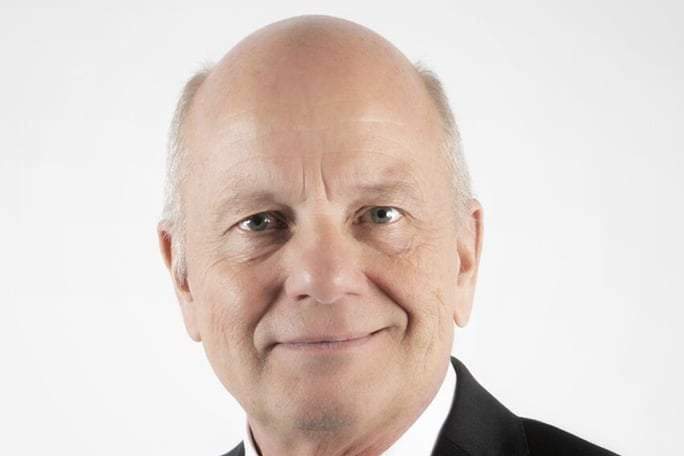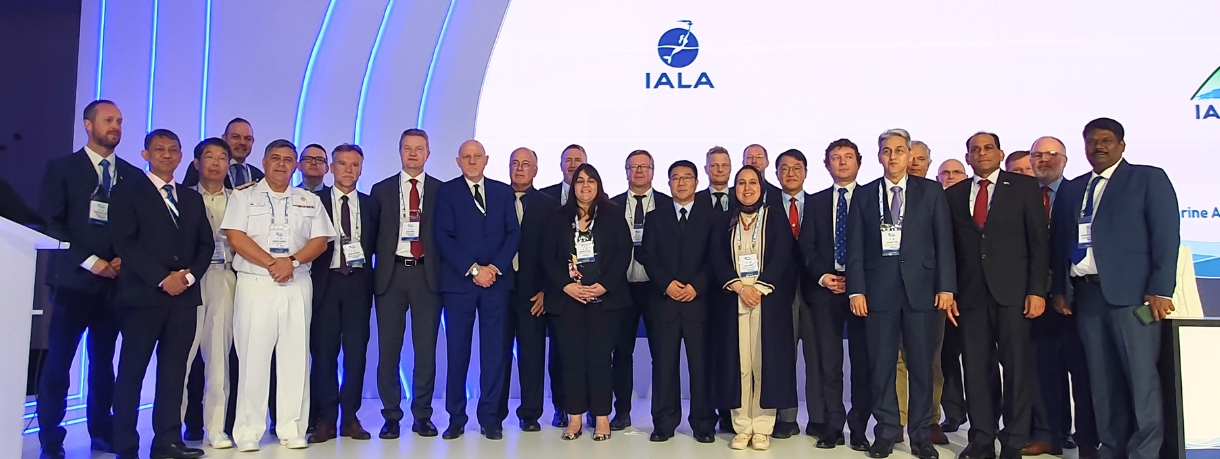KSA and many other Arabic countries have been very active in the organization
IALA Committees are working on promising systems like Range Mode (R-mode) and other solutions.
Harmonization of the solutions is vital. IALA has two major aims: to develop and to harmonize.
We managed to make the Arabic language as one of the official languages of the organization.
Geopolitical variables have influence on maritime safety which is also the case for other changes like climate
Interview by : Magdy Sadek ( Ports Magazine El Mawani )
His dream for the future of IALA is, that all Coastal States are Member States of the Organization and they agree on the development and harmonization of Marine Aids to Navigation.
This is what Francis Zachariae Secretary-General of the International Association of Marine Aids to Navigation and Lighthouse Authorities (IALA) confirmed in his first exclusive interview with Arab Media after the IALA became a governmental organization ( IGO ) after more than 10 years as (NGO )
He says to El Mawani: IALA Committees are working on promising systems like Range Mode (R-mode) and other solutions.
Added : Harmonization of the solutions is vital. IALA has two major aims: to develop and to harmonize and Corroborative the Arabic language is one of the official languages of the organization.
He explained that the KSA and many other Arabic countries have traditionally been very active in the organization and have participated in the work of the committees and the complicated diplomatic process.
Francis Zachariae began the work as Secretary-General of the International Association of Marine Aids to Navigation and Lighthouse Authorities (IALA) in February 2015.
After leaving high school Francis ZachariaeBIO Francis Zachariae joined the Royal Danish Naval Academy, followed in 1983 by service aboard several naval ships.
From 1988 to 1990 he was Aide-de-camp to the Minister of Defence. Francis Zachariae went back to sea in 1990.
At the same time as he was working with the Danish Ministry of Defence, Francis Zachariae completed a Master of Science, Public Administration, following which he was promoted to Captain (N) and appointed to Brussels to become Branch Chief and Advisor of the EU Council Secretariat.
This was his second experience abroad. From 1993 to 1994, Francis Zachariae attended the Collège Interarmées de Défense in Paris, France. In 2006, he was back at the Naval Academy, this time as Commandant.
Red Sea Crisis

-How do you view the unfortunate events in the Red Sea, and do you think that this crisis is on its way to being resolved?
As mentioned, it is a very unfortunate situation also for global shipping. As the Secretary-General of IALA I have no specific knowledge about when the crisis is over, but I hope soon.
Concept of maritime safety
Has the concept of maritime safety changed in light of geopolitical variables and the rules of the International Maritime Organization IMO ?
Well, it is clear that geopolitical variables have influence on maritime safety which is also the case for other changes like climate, etc. IALA we are concerned about different Aids to Navigation’s vulnerability especially digital once like Global Navigation Satellite Systems (GNSS); GPS and others.
These vital systems are vulnerable to natural and manmade disasters, because of their extremely low signal strength and shared frequency band. There are many well-documented incidents of disruption including false information, interruptions, loss of timing service, etc., each capable of creating potentially dangerous situations for shipping.
At the moment there are no immediate alternatives to GNSS, but the IALA Committees are working on promising systems like Range Mode (R-mode) and other solutions.
IALA has consultative status with the International Maritime Organization (IMO) since 1961 and has a very close cooperation. IALA assists the IMO with technical insight on Marine Aids to Navigation and Vessel Traffic Systems by inputting documents to IMOs committees and working groups and participating in all relevant meetings.
At the moment the IMO 2020 sulfur convention rightly attracts a lot of attention from the maritime world. It is very important to make shipping use less and alternative fuels. IALA is supporting this with digital solution making shipping more efficient and sustainable.
Shipping industry in 4IR era

The Fourth Industrial Revolution ( 4IR ) has had a great impact on the shipping industry, hasn’t it?!
Of course the fourth industrial revolution has impacted the shipping industry a lot although the maritime sector is still a bit conservative and behind some other sectors when it comes to digitalization.
The connectivity coming from satellites and 5g will change the environment in the near future because you will be able to be connected all over the globe at a low price. IALA has from the beginning been heavily involved in IMO e-Navigation Strategy and has contributed to many new and interesting projects.
If we want this ambitious digital agenda to succeed, harmonization of the solutions is vital. IALA has two major aims: to develop and to harmonize. Harmonization is complicated because you need many International organizations to work together to be successful.
At the moment the concept of S-100 data project specifications looks very promising when it comes to harmonizing digital solutions. The system is managed by the International Hydrographic Organization and IALA is responsible for the S200 register.
As we say: Everybody wants harmonization, but nobody wants to be harmonized. But of course we will succeed in the end.
The role of the organization IALA today

What is the role of the organization IALA today after it received international recognition and became an Intergovernmental Organization (IGO)?
The transition to an Intergovernmental Organization marks a new chapter in IALA’s history. This change will enable us to work even more closely with our members and partners to ensure safe, harmonized, and more efficient marine navigation worldwide.
I also want to emphasize that in times of conflict and war, the creation of an international organization like IALA, which brings together people from around the world in a spirit of cooperation and compromise, underscores the importance of understanding and mutual respect.
Key benefits of the status change: enhanced international cooperation, strengthened harmonized framework, improved resource allocation, and greater global influence.
5-Let me ask what are your mechanisms to enhance worldwide safety of navigation and protection of the marine environment and is it limited only to member states?
The mechanism is to provide standards, recommendations and guidelines for the implementation of significant developments within the maritime sector.
The aim of the Organization is to bring together governments and organizations concerned with the regulation, provision, maintenance or operation of Marine Aids to Navigation in order to further the objectives of:
(a) Fostering the safe and efficient movement of vessels through the improvement and harmonization of Marine Aids to Navigation worldwide for the benefit of the maritime community and the protection of the marine environment;
(b) Promoting access to technical cooperation and capacity building on all matters related to the development and transfer of expertise, science, and technology in relation to Marine Aids to Navigation;
(c) Encouraging and facilitating the general adoption of the highest practicable standards in matters concerning Marine Aids to Navigation; and
(d) Providing for the exchange of information on matters under consideration by the Organization.
6-What is meant to develop and harmonize Marine Aids to Navigation as governments will be directly involved in your work?
The responsibilities Arab Countries
KSA is among four Arab countries that participated in the organization’s membership. To what extent did it play a role in its activities and the extent of its interaction?
KSA and many other Arabic countries have traditionally been very active in the organization and have participated in the work in the committees and in the complicated diplomatic process.
By hard diplomatic work they managed to make the Arabic language as one of the official languages of the organization.
Shipping is important to most Arabic countries and there are many, complex and sophisticated Aids to Navigation in the Gulf that need careful development and maintenance.
So the Arabic countries benefit from the membership of IALA, but the organization also benefits from the knowledge of our good colleagues from these countries both from national authorities and private companies.
My dream for the future of IALA
What are your plans? Will you accept more countries as members? Are you thinking of opening a regional headquarters? And what is your work strategy in line with digital changes, automation, and an era of artificial intelligence technology?
My dream for the future of IALA is, that all Coastal States are Member States of the Organization and that they agree on the development and harmonization of Marine Aids to Navigation.
I must say that I am not, as some others, afraid of the digital future and artificial intelligence. I see many opportunities for the maritime sector, but we need to – as mentioned many times – harmonize the effort, because shipping is the most global sector in the world.
In the maritime sector, there is room for improvement, because we are a bit conservative. We must realize that the sector is mostly driven by business cases and regulations. All the digital solutions we propose must support one of them.
I think there has been a tendency to have a solution looking for a problem in the past.
These times are over, and we need to produce solutions that help create a good business case, helping with overcoming regulation while also protecting the marine environment. Those issues are key to IALA.
Source : Saudi Ports Magazine El Mawani
Read more :
Exclusive with Gavin Allwright : Secretary General of (IWSA) ( 1- 3 )
Exclusive with Gavin Allwright Secretary General of IWSA ( 2- 3 )
Exclusive with Gavin Allwright Secretary General of IWSA (3-3)






